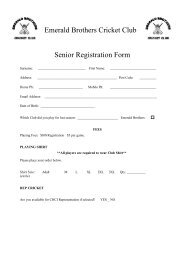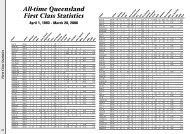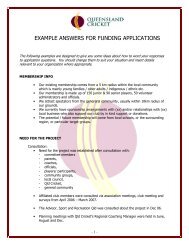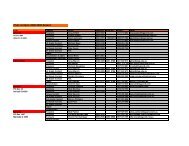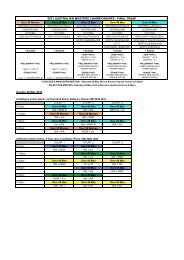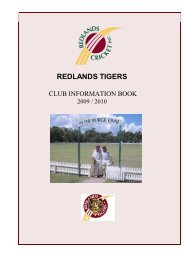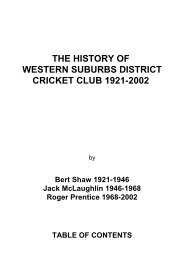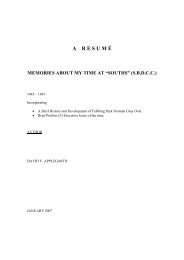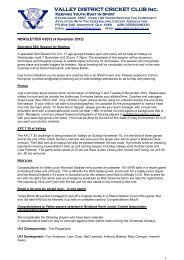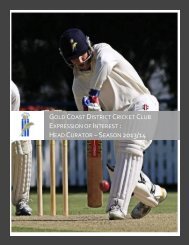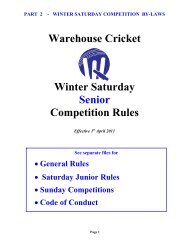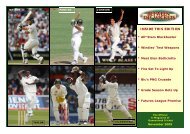QCSA Handbook on scoring 2010 - Queensland Cricket
QCSA Handbook on scoring 2010 - Queensland Cricket
QCSA Handbook on scoring 2010 - Queensland Cricket
- No tags were found...
Create successful ePaper yourself
Turn your PDF publications into a flip-book with our unique Google optimized e-Paper software.
ook to ensure it balances, and c<strong>on</strong>tinually compare your book with yourpartner’s to ensure their book is correct and balances with your book. Atthese times, make sure you ‘voice’ all entries you make in your book.If you are <strong>scoring</strong> with a new scorer, again you will need to take a leading roleand provide assistance to your fellow scorer. It is important in this situati<strong>on</strong>to mentor and provide any help and assistance you can, answer theirquesti<strong>on</strong>s and provide advice and instructi<strong>on</strong> where you can. Ensure you‘voice’ all entries you make in your book and take resp<strong>on</strong>sibility to ensureyour books balance.As an advanced scorer, you may be invited to score for a media organisati<strong>on</strong>or as an <strong>on</strong>line scorer. In these situati<strong>on</strong>s, as you are not the official scorer,you will need to ensure you c<strong>on</strong>centrate at your highest level to catchumpires signals, as they will not be signalling to you or waiting for yourresp<strong>on</strong>se — they will be signalling to the official scorers.In these situati<strong>on</strong>s, you will not have a partner to help correct any oversights;however, these games will generally be at a higher level, so there should be ascoreboard that you can use to your advantage, or there may be a member ofthe media organisati<strong>on</strong>’s crew willing to act as a sec<strong>on</strong>d set of eyes for you t<strong>on</strong>ote catchers or late umpire’s calls, when your eyes may already be down atyour book.Twenty20 matchesYou must be <strong>on</strong> your toes at all times, as these matches are fast and furious,especially if you are <strong>scoring</strong> women’s or junior cricket. If you find it difficultto keep up with the pace of the match, there are some shortcuts you can taketo make your (<strong>scoring</strong>) life easier.• Make sure you have all your match details completed for both inningsof the match, as far as possible, before the start of play, as there isusually <strong>on</strong>ly a 10 or 15 minute break between innings.• Keep your running sheet as normal, but there is probably no need tokeep records of progressive individual or partnership minutes, as thereare no breaks, and the innings <strong>on</strong>ly goes for 80 minutes. As l<strong>on</strong>g as youhave the time in and time out for all batters, you can easily count uptheir total minutes at the end of the innings or match, or during abreak in play (a lot of big 6s are scored in Twenty20, so you might getthe occasi<strong>on</strong>al break while they retrieve the ball).<strong>Queensland</strong> <strong>Cricket</strong> Scorers Associati<strong>on</strong>69



